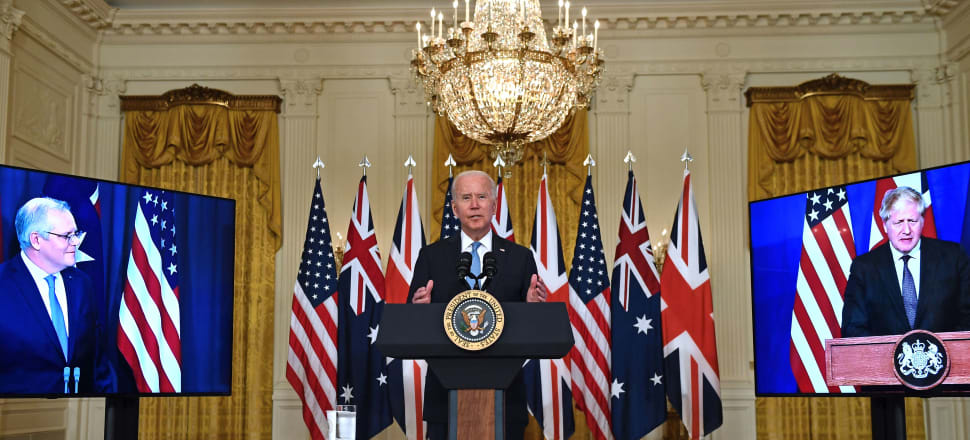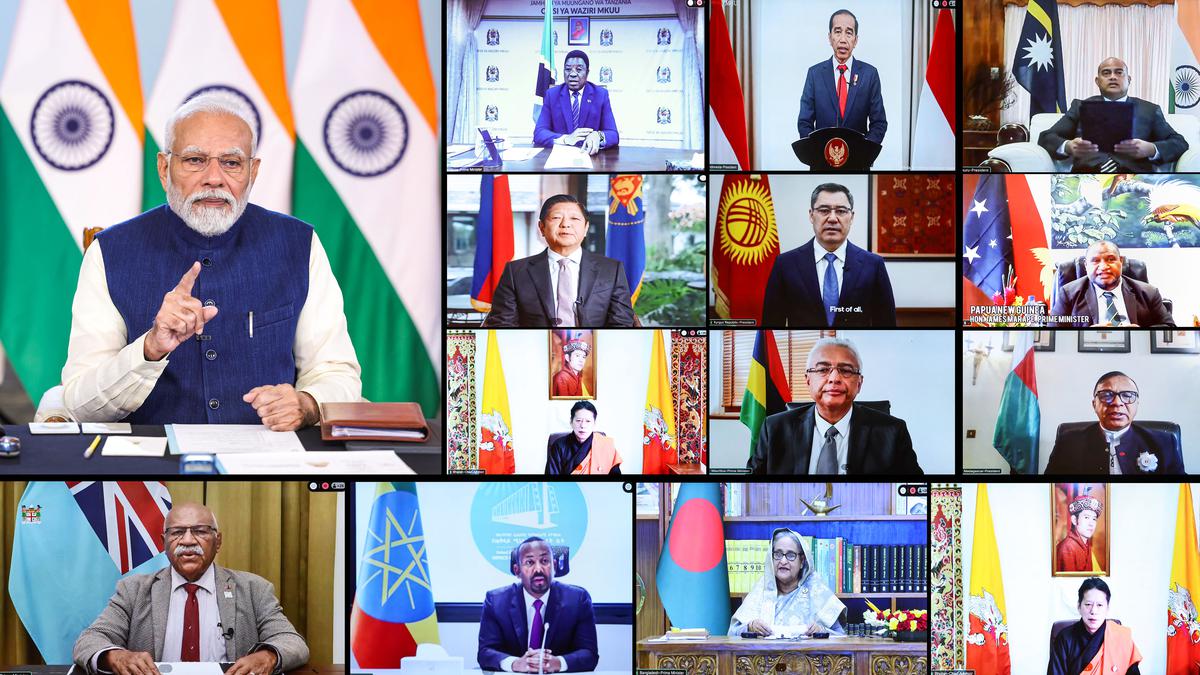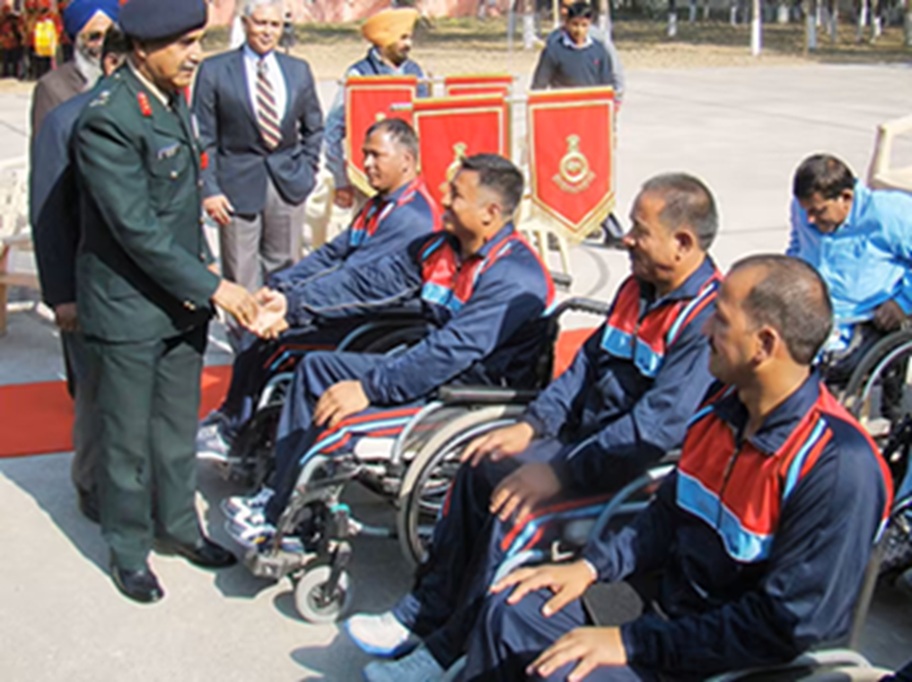AUKUS is a trilateral security pact between Australia, the United Kingdom and the United States
On 15 Sept 2021, Australia-United Kingdom-United State announced through virtual mode the formation of a trilateral security pact called AUKUS. Since the very first day of the AUKUS announcement, the pact has been shrouded with conflicts and confusion. While many experts say the AUKUS is focused on belligerent communist-ruled China, others fear this pact may facilitate Cold War II with the devastating impact of Cold War I somewhat fresh.
Prime Minister Modi, a prominent member of the Quadrilateral Security Dialogue or Quad, didn’t tell anything about the CW II possibility. Instead, he opined AUKUS will compliment Quad, which is in fact not exactly a military or security alliance although as we all know Quad has been facilitating large-scale military exercise nicknamed Malabar Exercise annually in the Indo-Pacific region –while there were occasional breaks- since its humble beginning in 1992 as an IN-USN Exercise. Later on Japan and Australia, the other two Quad members now, have joined the annual muscle-flexing -telling the world it is to build military interoperability- converting the exercise from bilateral to multilateral exercise nowadays.
Malabar Exercise, which began as a bilateral exercise, is now one of the cornerstones of military interoperability of the Quad forces, and Chief of Defence Staff General Bipin Rawat said that the Quad’s charter is to ensure freedom of navigation for all nations. From the above description, it is in fact difficult to discount that Quad has nothing to do with China-centric security concerns.
News of the alliance AUKUS received a positive response in Singapore. The island-state’s Prime Minister Lee Hsien Loong told Morrison in a phone call he hoped the nuclear deal would contribute constructively to the peace and stability of the region and complement the regional architecture, Singapore’s Ministry of Foreign Affairs said in a statement.
What for AUKUS?
Under the pact, the US and the UK will help Australia to acquire eight numbers of nuclear-powered submarines replacing the latter’s 2016 signed massive $66 billion contracts with France’s Naval Group for twelve diesel-powered conventional submarines –to replace Australia’s own-built six Collins-class submarines by 2036- on which Australia has already invested $2.6 billion. Although the joint announcement of two heads of government (PMs) and one state (President) did not mention any other country by name, anonymous White House sources have alleged it is designed to counter the influence of China in the Indo-Pacific region. However, UK PM Boris Johnson later told the British parliament that the move was not intended to be adversarial toward China.
The pact also includes cooperation on “cyber capabilities, artificial intelligence, quantum technologies, and additional undersea capabilities”. Under the pact, Australia will acquire new long-range strike capabilities for its air force, navy, and army. The pact will focus on military capability, separating it from the Five Eyes intelligence-sharing alliance that also includes New Zealand and Canada. And this has happened when Biden Administration is considering expanding Five Eyes to Nine Eyes including Germany from Europe, India from Indian Ocean Region, and South Korea and Japan from the Western Pacific region, the last three are from the Indo-Pacific region considered as the most happening region in the world in view of Chinese belligerence on the one side and the world’s 61% population live here and the region contributed 62% to the world GDP apart from the region is world manufacturing hub on the other hand.
Here, all who matter concerning China should not ignore that she is at the loggerhead with India, South Korea, and Japan from border dispute to trade, while Germany is friendly with China and she is the largest trading partner with China from European Union -the world’s third-largest trading bloc- and in December 2020 under the leadership of German, EU signed long-pending Comprehensive Agreement for Investment(CAI) with China –now in cold storage due to Biden Administration’s pressure-, which China desperately looking for during her on-going acrimonious trade dispute with the world largest economy -started during Trump Administration-, and there is no sign of the same cooling down in near future.
AUKUS and China Angle
Here, the questions to arise that why Australia is found aggressive in joining AUKUS and Quad alliances and acquiring military latest gadgets nowadays? To remind my readers, I would like to bring to the notice that in 2007 the then PM of Australia Chinese speaking Kevin Rudd withdrew Australia from Malabar Exercise saying ‘Australia and the region can’t afford another Cold War’. And since then till the advent of dreaded allegedly Chinese origin Covid19, Australia refused to join Malabar Exercise. Australia’s aggressive demand for the investigation of the origin of the pandemic has not been taken lightly by China, the former’s largest trading partner. China has imposed punishing restrictions on Australia’s exports. Despite this, Australia did not succumb, and instead look for alternative export destinations and somehow have compensated for the loss. And, in the meanwhile, China threatened Australia to target with long-range ballistic missiles with a nuclear warhead, which can reach island nation from China mainland, a la she threatened Japan after the latter wished to join US forces to save democratic self-ruled Taiwan from former’s attempt to encroach, and designed the tiny democratic isle ‘a country’, so far studiously avoided.
AUKUS, Democratic Alliance and Cold War II
During Cold War I, the world was divided into four blocs: Western-Democratic-Capitalist-Developed bloc under the US leadership, Socialist bloc under the USSR leadership, Non-Aligned Movement (NAM)-Developing and Underdeveloped bloc and China, latter the most populous among the countries in the world those days was neither attached nor aligned with any bloc after 1969 border dispute resulting in a brief but lethal military conflict with the USSR. Though NAM was the largest inter-governmental bloc in so far as a number of countries as its members is concerned, the majority of member countries in the bloc were undemocratic, ruled by dictators, and mostly aligned with the Socialist bloc. Therefore, many experts used to argue that for all practical propose, during the Cold War I, the world was divided into two blocs comprising Democratic bloc and Socialist bloc.
Finally, the Democratic bloc facilitated by its accumulated disposable capitals and advanced technologies trumped over economically weak Socialist bloc despite the latter’s equally strong conventional military and N-weapon capabilities in 1991, the year when finally the USSR was disintegrated. And this happened due to the united fight of the Democratic bloc overall issues concerning national affairs management in the Socialist bloc.
Now, an in-depth study of what has been happening in the Indo-Pacific region tells very unambiguously that the 21st Century’s world is fast moving towards another bout of Cold War centred around Indo-Pacific despite former Australian PM Kevin Rudd’s 2007 preventive major which had, in fact, weakened the CW II march for about one decade.
In the prospect of the new Cold War, it is again Socialist authoritarian Communist centric, which under Xi Jinping is now found highly belligerent and quarrelling with military posturing and coercive and debt diplomacy with all who oppose Chinese aggression on the border, in the sea, trade relations and investments. And he needs to be defeated by democratic force. How the same will be achieved if there is no unity among the democratic forces?
Conclusion
There is no doubt that AUKUS will complement Quad. And, at the same time, the significance of France and the EU should not be discounted. AUKUS could have been accommodated diplomatically without annoying democratic France which is the second-largest democracy and economic power in developed and democratic EU apart from she is a Veto wielding member in UN Security Council, major arms exporter to the Indo-Pacific region, a residential power as one and half million French citizens live in the region with two naval bases where 8000 French military personals stationed permanently. So also EU has got a huge investment in the region and both have recently developed Indo-Pacific policy frameworks, and the EU has accepted Biden pressure over the issue of CAI.
Post-AUKUS, France Foreign Minister and Defence Minister in a joint presser called the deal “a stab on the back” and ordered the immediate withdrawal of France Ambassador to Canberra and Washington DC. While the diplomatic relation with Washington was restored after President Biden’s telecall to President Emmanuel Macron, who on the eve of the France presidential election next year is facing 1966 Charles de Gaulle moment. But, so far, President Macron has not allowed Scott Morison to have a tele conversation with him despite the latter’s several attempts, forget about the restoration of diplomatic relations between the two prominent democracies in the Indo-Pacific (as France is a residential power).
Reacting to the AUKUS deal, Charles A Kupchan, Senior Fellow in Council on Foreign Relations writes, “AUKUS, a deal for the United States and the United Kingdom to provide Australia with submarines, has infuriated France at a time when transatlantic coordination to deal with China’s rise crucial.”
Disclaimer: The views and opinions expressed by the author do not necessarily reflect the views of the Government of India and Defence Research and Studies
Title image courtesy: https://www.newsroom.co.nz/aukus-deals-awkwardness-for-new-zealand





